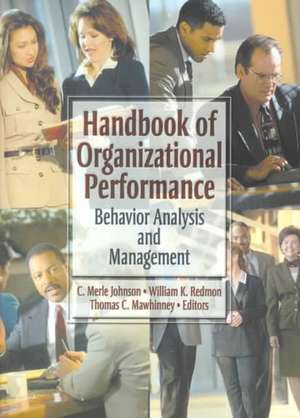Handbook of Organizational Performance: Behavior Analysis and Management
Autor William K. Redmon, Thomas C. Mawhinney, Carl Merle Johnsonen Limba Engleză Paperback – 10 mai 2001
Whether you work in a smokestack industry, the service sector, or a high-tech information-based business, the basic principles of industrial/organizational psychology you will find in The Handbook of Organizational Performance can help you obtain better performance from your employees. This comprehensive volume contains all the information you need to understand on-the-job behavior and effectively manage your employees.
The Handbook of Organizational Performance gives you the tools and techniques you need to reward positive employee behaviors and correct undesirable ones before they become destructive habits. Using the principles of industrial/organizational psychology, you will learn how to train employees, how to determine criteria for performance appraisals, and how to establish leadership in the workplace.
The Handbook of Organizational Performance is a comprehensive guide to all areas of management, including:
- designing more effective training
- managing occupational stress
- using ”pay-for-performance” plans
- reducing job-related injury and illness
- taking an active role in occupational safety
- encouraging business ethics
Preț: 477.32 lei
Preț vechi: 690.15 lei
-31% Nou
Puncte Express: 716
Preț estimativ în valută:
91.33€ • 95.37$ • 75.42£
91.33€ • 95.37$ • 75.42£
Carte tipărită la comandă
Livrare economică 15-29 aprilie
Preluare comenzi: 021 569.72.76
Specificații
ISBN-13: 9780789010872
ISBN-10: 0789010879
Pagini: 496
Dimensiuni: 148 x 210 x 33 mm
Greutate: 0.64 kg
Ediția:1
Editura: Taylor & Francis
Colecția Routledge
Locul publicării:Oxford, United Kingdom
ISBN-10: 0789010879
Pagini: 496
Dimensiuni: 148 x 210 x 33 mm
Greutate: 0.64 kg
Ediția:1
Editura: Taylor & Francis
Colecția Routledge
Locul publicării:Oxford, United Kingdom
Cuprins
Contents
- About the Contributors
- Contributors
- Foreword
- Acknowledgments
- Part I: Foundations
- Chapter 1. Introduction to Organizational Performance: Behavior Analysis and Management
- Recurring Themes in the OBM Research Literature
- Conclusion
- Chapter 2. Principles of Learning: Respondent and Operant Conditioning and Human Behavior
- Respondent Conditioning
- Operant Conditioning
- Verbal Behavior
- Rule-Governed Behavior
- Concluding Comments
- Chapter 3. Developing Performance Appraisals: Criteria for What and How Performance is Measured
- Problems with What to Appraise
- The “How” Issues in Performance Appraisal
- What Can Be Done to Improve Content and Method?
- New Criteria for Criteria
- Identifying What Should Be Appraised
- Chapter 4. Within-Group Research Designs: Going Beyond Program Evaluation Questions
- Scientific Method: Matching Research Questions and Designs
- Drawing Inferences with Confidence
- Within-Group Designs
- Answering Program Evaluation Questions Using Within-Group Designs
- Assessing Trends Over Time Using Within-Group Designs
- Problems Using Within-Group Designs to Address Comparison Questions
- Assessing Impact of Multiple Treatments: Alternatives to Asking Comparison Questions
- Within-Group Designs in Perspective
- Chapter 5. Schedules of Reinforcement in Organizational Performance: Application, Analysis, and Synthesis
- The Basic Importance of Schedules
- Schedules of Reinforcement: The Basics
- Schedules of Reinforcement: The Research
- Application, Analysis, and Synthesis
- Theoretical Issues and Future Directions
- Part II: Applications of the Behavioral Model
- Chapter 6. Training and Development in Organizations: A Review of the Organizational Behavior Management Literature
- The Importance of Instruction
- Training Research
- Comparison Research
- Training and Motivation
- Program Development
- Critique and Future Research Directions
- Conclusion
- Chapter 7. Leadership: Behavior, Context, and Consequences
- A Behavior Analytic Vantage Point on Leadership
- Selection by Consequences As a Causal Mode
- Contiguity- and Molar Correlation-Based Laws of Effect
- Necessary Conditions for Leadership
- Discussion and Conclusions
- Chapter 8. The Management of Occupational Stress
- Job Satisfaction
- The Measurement of Job Stressors
- Approaches to the Treatment of Occupational Stress
- Treatments for Occupational Stress
- Conclusions and Recommendations
- Chapter 9. Pay for Performance
- Variety of Plans
- Behavioral Approaches to Performance-Based Pay
- Common Elements
- Future Research
- Chapter 10. The Safe Performance Approach to Preventing Job-Related Illness and Injury
- Current Approaches to Dealing with Safety
- Reasons for Unsafe Performance
- The Safe Performance Model
- Summary and Conclusions
- Chapter 11. Actively Caring for Occupational Safety: Extending the Performance Management Paradigm
- An Actively Caring Model
- Empirical Support for the Actively Caring Model
- Assessment of Actively Caring Factors
- Actively Caring in Action
- Chapter 12. A Behavioral Approach to Sales Management
- Background
- The Behavioral Sales Management Model (BSM): An Overview
- Final Thoughts
- Part III: Professional and Theoretical Issues
- Chapter 13. Marketing Behaviorally Based Solutions
- Defining Core Products/Services
- Advertising and Promotion
- Sales and Market Research
- Conclusion
- Chapter 14. Organizational Behavior Management and Organization Development: Potential Paths to Reciprocation
- Definition and Comparison of OD with OBM
- Does OD Work?
- OMB and OD: Potential for Reciprocation
- Paths to Reconciliation
- Summary and Conclusions
- Chapter 15. Social Learning Analysis of Behaviora
Notă biografică
William K Redmon, Thomas C Mawhinney, Carl Merle Johnson
Descriere
The Handbook of Organizational Performance contains all the information you need to effectively manage your employees . Using the principles of industrial/organizational psychology, you will learn how to perform behavior analysis and management, how to determine criteria for performance appraisals, and how to establish leadership in the workplace. Enhanced with helpful charts, tables, and figures, The Handbook of Organizational Performance is an indispensable management tool and an essential text for students of business.
To view an excerpt online, find the book in our QuickSearch catalog at www.HaworthPress.com.
To view an excerpt online, find the book in our QuickSearch catalog at www.HaworthPress.com.





